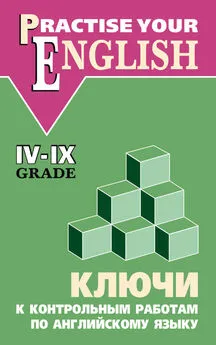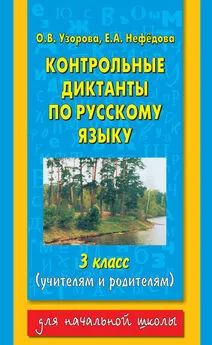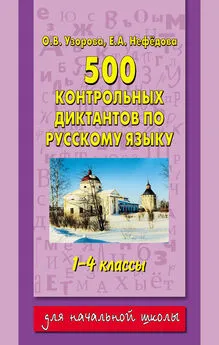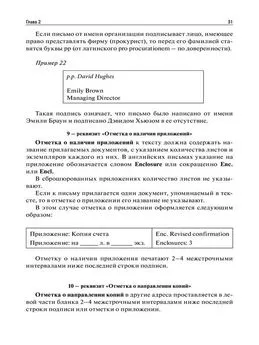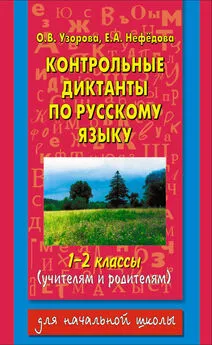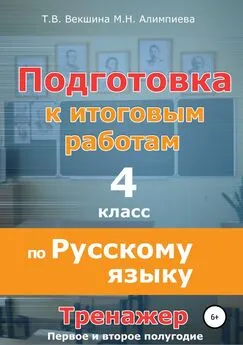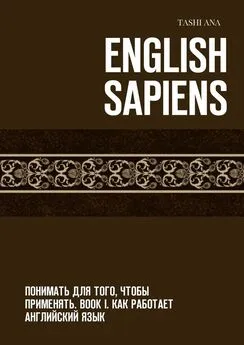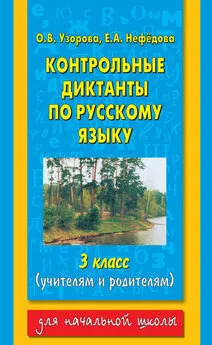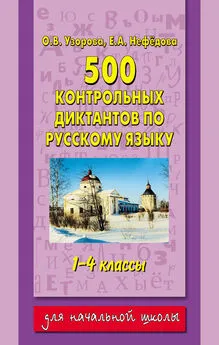Ольга Акимова - Ключи к контрольным работам по английскому языку (IV–IX классы)
- Название:Ключи к контрольным работам по английскому языку (IV–IX классы)
- Автор:
- Жанр:
- Издательство:неизвестно
- Год:неизвестен
- ISBN:978-5-9925-0234-3
- Рейтинг:
- Избранное:Добавить в избранное
-
Отзывы:
-
Ваша оценка:
Ольга Акимова - Ключи к контрольным работам по английскому языку (IV–IX классы) краткое содержание
Ключи к контрольным работам по английскому языку (IV–IX классы) - читать онлайн бесплатно ознакомительный отрывок
Интервал:
Закладка:
Акимова О. В.
Ключи к контрольным работам по английскому языку (IV–IX классы)
IV
Grade
Grade IV. Test 1
Reading
1.1.1 – false; 2 – false; 3 – true; 4 – false; 5 – true; 6 – false; 7 – true; 8 – true
Use of English
1.2.Bob and Sally arefrom York. John isnew in York. He isfrom Bath. Ron and Betsy arein the 5th grade. Joseph isfrom the village near York. Ron and Betsy arefriends. They areeleven. John iseleven, too. But Bob isn’televen. Bob and John arefriends, but they aren’tin the same class. Betsy isa lively girl. Sally isn’tlively. She isa very quiet girl.
1.3.
1. Peter is not at work at moment.
2. That is very kind of you.
3. My shoes are very dirty.
4. What colour is your car?
5. Are books expensive in your country?
6. Finland is not a very big country.
7. Those plants are very beautiful.
8. Paris is not the capital of Italy.
9. How old is your mother?
10. The beautiful old church is in the very corner of the street.
1.4.1. their 2. your 3. his 4. your 5. their 6. their 7. her 8. our 9. your
1.5.1. mother’s, mothers 2. hamsters, hamster’s 3. sisters, sister’s 4. friends, friend’s 5. teacher’s, teachers
1.6.1. some 2. any 3. something 4. any/some 5. some 6. any 7. somebody 8. some/any
1.7.1 – d; 2 – f; 3 – a; 4 —i; 5 – b; 6 – g; 7 – c; 8 – e; 9 – h
1.8.1. autumn 2. terrible 3. bright 4. often 5. weather 6. tomorrow 7. snows 8. season 9. beautiful
Grade IV. Test 2
Reading
2.1.1 – true; 2 – false; 3 – true; 4 – false; 5 – true; 6 – true; 7 – false; 8 – false
Use of English
2.3.
1. Have you got a bike? – Yes, I have.
2. Has Liz got a sister? – No, she has not.
3. Has Mike got a school bag? – Yes, he has.
4. Have the Greens got a new car? – Yes, they have.
5. Has Colin got my exercise-book? – No, he has not.
6. Has your friend got a brother? – Yes, he has.
7. Have you got my pencil case? – Yes, I have.
2.4.1. There is 2. There is 3. There are 4. There is 5. There are 6. There is 7. There are 8. There is 9. There are 10. There is
2.5.
1. Does Nelly live at the seaside in summer?
Nelly does not live at the seaside in summer.
2. Does Peter go to bed late?
Peter does not go to bed late.
3. Do you buy vegetables in the market?
I do not buy vegetables in the market.
4. Does father swim in the lake?
Father does not swim in the lake.
5. Does he take Tom with him?
He does not take Tom with him.
6. Do they clean their rooms on Saturdays?
They do not clean their rooms on Saturdays.
7. Does he try to do it?
He does not try to do it.
2.6.1. do 2. have 3. go 4. am sitting 5. is washing 6. is reading 7. visit 8. play 9. are going
2.7.
1. is practicing
Is he still playing …?
2. am using
3. Are you sleeping?
am reading
Do you often read …?
4. is shining, are singing
5. … are they doing?
is learning …
is tidying …
6. … does your husband work?
works
7. sit, am sitting
2.8.1. meals 2. dinner 3. potatoes, tomatoes 4. porridge 5. juice 6. hungry, bread, butter 7. soup 8. ice-cream
2.9.1. breakfast 2. bread, salt 3. hungry 4. apple 5. juice 6. meals 7. ice-cream 8. cup 9. pass 10. thirsty
2.10.1. some 2. I had porridge 3. How much… is 4. How many 5. much 6. an apple/some apples 7. I had soup 8. is
Grade IV. Test 3
Reading
3.1.5, 6, 2, 3, 7, 8, 4, 9, 1
Use of English
3.2.1. this 2. that 3. these, These, those 4. this 5. these, this 6. this, these 7. these, Those 8. this, this
3.3.
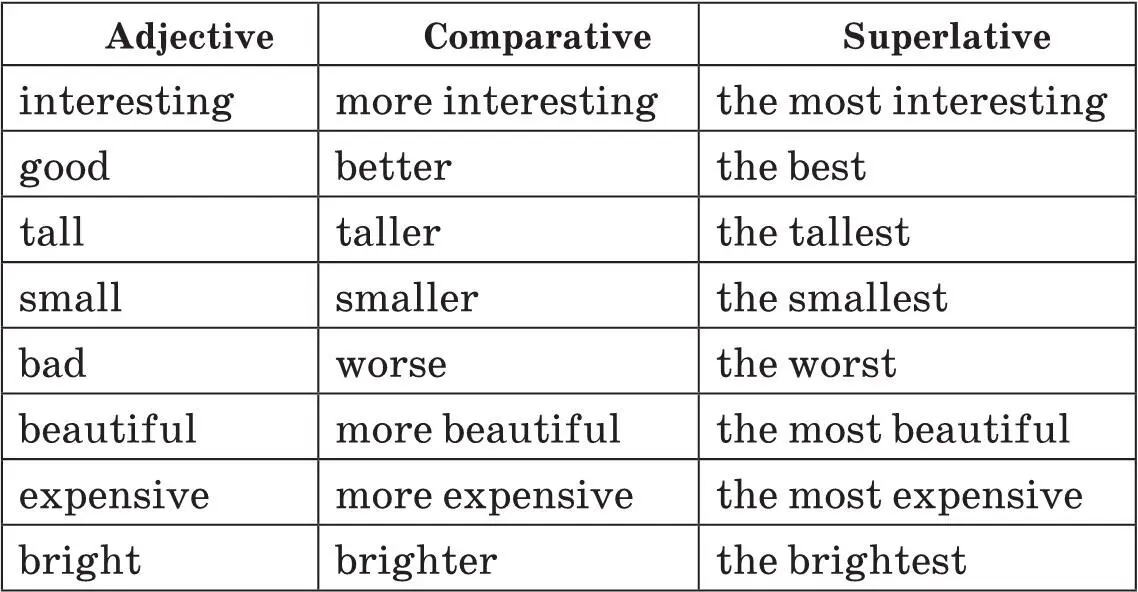
3.4.
1. old, older
2. good, better, better, better, the best
3. warmest, warm, warmer, warm
4. hotter, the hotTest, hot
5. beautiful, the most beautiful, beautiful
3.5.
1. …had, last Saturday.
2. …went, last Sunday.
3. …went, yesterday morning.
4. Did, last summer.
5. …went, that winter.
6. …was, that autumn.
7. …had, yesterday.
8. …got up, yesterday morning.
9. Did, yesterday evening.
10. …did not, last Sunday.
3.6.
1. Did it snow a lot last week?
It did not snow a lot last week.
2. Did she travel a lot last year?
She did not travel a lot last year.
3. Did the shop close at 6 yesterday?
The shop did not close at 6 yesterday.
4. Did she help her Mum with the festive dinner?
She did not help her Mum with the festive dinner.
5. Did he write a lot of postcards yesterday?
He did not write a lot of postcards yesterday.
6. Did she sing a lot of popular songs yesterday?
She did not sing a lot of popular songs yesterday.
7. Did he walk all day long yesterday?
He did not walk all day long yesterday.
3.7.1. go 2. likes 3. celebrated 4. Did, did 5. walked, was 6. doesn’t rain 7. go, come/went, came 8. writes
3.7.1. puppy 2. mice 3. tortoise 4. domestic 5. beautiful 6. mouth 7. tail 8. wolves 9. grew 10. quickly
3.8.1. neck 2. ears 3. legs 4. fingers, toes 5. nose/ hair 6. teeth 7. eyes 8. slowly 9. quickly 10. happy
Grade IV. Test 4
Reading
4.1.1. to the coast 2. at the weekend 3. never 4. having fun out doors 5. Scotland 6. at the seaside 7. Italy 8. France 9. road 10. in the tent
Use of English
4.2.1. much, many 2. many, much 3. many, many 4. many 5. much, many 6. many, much 7. much 8. much, much
4.3.1. How old 2. What 3. Who 4. Where 5. Who 6. How many 7. Where 8. Where 9. How many 10. What 11. How old
4.5.
Ben won’t wash up at the weekend.
Ben will relax at the beach at the weekend.
Ben won’t cook supper at the weekend.
Ben will do sports at the weekend.
Ben won’t read a new book at the weekend.
Ben won’t go to the country at the weekend.
Ben won’t sleep late at the weekend.
4.6.1. couldn’t, can 2. couldn’t 3. could 4. Could 5. can’t 6. Can, can’t 7. could/couldn’t 8. can/can’t 9. Could
4.7.1. mountains 2. forest 3. fields 4. basketball 5. swimming 6. busy 7. week
4.8.1. before 2. Where 3. clean my teeth 4. goes to bed 5. Yes, I will 6. weekend 7. carry my bag 8. afternoon
Grade IV. Test 5
Reading
5.1.1 – false; 2 – true; 3 – false; 4 – false; 5 – false; 6 – false; 7 – true; 8 – false; 9 – false; 10 – false; 11 – true; 12 – false
Use of English
5.2.1 – c; 2 – b; 3 – a; 4 – b; 5 – c; 6 – c; 7 – b; 8 – b; 9 – a; 10 – b
5.3.
5.4.1. at 2. at 3. to, from, till 4. for at 5. at 6. on 7. to, on 8. to, from 9. with
5.5.1. What 2. Who 3. When 4. Why 5. Where 6. Why 7. What 8. What
5.6.1. isn’t she 2. is he 3. can’t she 4. mustn’t you 5. aren’t 6. did he 7. do they 8. won’t he 9. can she 10. were they 11. hasn’t he
5.7.1. laughed 2. comfortable 3. uniform 4. museums 5. leaves 6. count 7. outdoors 8. famous 9. important
5.8.1. meeting 2. comfortable 3. handicraft 4. timetable 5. book-case 6. outdoors 7. famous 8. twice
5.9.1. meet 2. comfortable 3. classes 4. street 5. study 6. late 7. well 8. poor/good 9. flow/flow in 10. easy/difficult 11. easy 12. interesting/difficult
Grade IV. Test 6
Reading
6.1.1 – b; 2 – c; 3 – a; 4 – b; 5 – c
Use of English
6.2.had, lived, knew, met, gave, took, went, bought, met, decided, gave, took, went, saw, did not give, went, found, entered, put, took
6.4.
1. Bob is going to the swimming pool on Friday.
2. I am not going to buy a scooter.
3. Are they going out in the evening?
4. Mum is going to buy meat for dinner.
5. Is she going to visit France in summer?
6. What are you going to do in future?
7. She is not going to leave soon.
8. Dave is going to enter the university.
6.5.1 – b; 2 – a; 3 – b; 4 – a; 5 – b; 6 – b; 7 – b
6.6.1. behind 2. shout 3. keys 4. armchair 5. curtains 6. mirror 7. Describe 8. opposite 9. believe 10. cupboard
6.7.1. rather 2. locks 3. fine/nasty 4. quiet 5. happen 6. listen to 7. believe 8. long ago 9. is tasty, is true 10. I am afraid/I think
Grade IV. Test 7
Reading
7.1.
1. All the rooms of the house are a different colour and they are in funny places.
2. Downstairs there is a green room with lots of books about magic.
3. Merlin does his magic in the library.
4. The living-room is brown.
5. The kitchen is upstairs.
6. It is a funny house. All the rooms of the house are a different colour and there are stairs inside the house, and outside there is a ladder.
Use of English
7.2.
1. Where did you go yesterday?
2. Who did he take to the south?
3. Where did Mrs. Brown live in London?
4. What did Mr. Jackson do for a living in New York?
5. When did you get up in the morning?
6. When did the play start?
7. How did you get here?
8. What did you see in London?
9. What did she buy in the supermarket?
10. Whom did you see in the office?
7.3.
to begin – began – begun
to bring – brought – brought
to buy – bought – bought
to catch – caught – caught
to eat – ate – eaten
to find – found – found
to get – got – got
to give – gave – given
to go – went – gone
to have – had – had
to know – knew – known
to make – made – made
to meet – met – met
to put – put – put
to say – said – said
to see – saw – seen
to speak – spoke – spoken
to swim – swam – swum
to take – took – taken
to understand – understood – understood
to write – wrote – written
7.4.1. have learned 2. has lived 3. has lost 4. has not attended 5. have been 6. has already finished 7. has never taught 8. have moved 9. haven’t bought 10. have gone out
Читать дальшеИнтервал:
Закладка:
